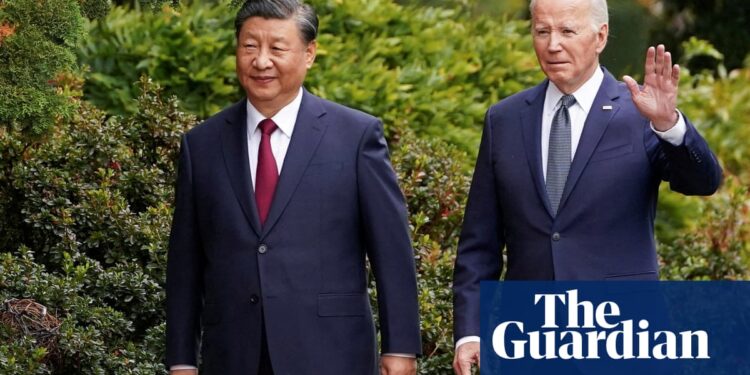Joe Biden will meet with Xi Jinping Saturday afternoon in what is expected to be the last time the two leaders meet before Donald Trump assumes the US presidency in January.
The two leaders are attending the annual Asia-Pacific Economic Cooperation (Apec) summit in Peru and are expected to have a meeting on the sidelines of the summit.
The White House said that Biden will communicate that the two countries need to maintain “stability, clarity and predictability through this transition”.
“Transitions are uniquely consequential moments in geopolitics. They’re a time when competitors and adversaries can see possible opportunity,” Jake Sullivan, the national security adviser, said earlier this week.
Biden is expected to talk with the Chinese president about increasing Chinese efforts to halt North Korea’s escalating role in the conflict between Russia and Ukraine. In recent weeks, the Pentagon and Nato confirmed that about 10,000 North Korean troops were sent to help Russia’s offense in Ukraine.
Biden met on Friday with Yoon Suk Yeol, the South Korean president, and Shigeru Ishiba, the Japanese prime minister, and affirmed the alliance among the three countries. The three leaders agreed that “it should not be in Beijing’s interest to have this kind of destabilizing cooperation take place in the region”, a senior administration official said in a briefing on background.
Trump’s imminent return to the White House casts a dark shadow over the conversation as it remains unclear what his second term will mean for the relationship between the US and China.
On the campaign trail, Trump touted a hawkish approach to China, promising to increase tariffs to 60% on Chinese imports, which could be as much as $500bn worth of goods. Trump has also promised to end Russia’s war in Ukraine “in 24 hours”, which some fear means decreasing the flow of military aid to Ukraine or pushing the country to lose territory to Russia. A general backing away from the conflict could give room for China to step up as an intermediary, increasing its presence on the global stage.
Among Trump’s blitz of cabinet nominee announcements was the appointments of Florida senator Marco Rubio as secretary of state and Republican representative Mike Waltz as national security adviser, both of whom have have voiced hawkish views on China.
Xi congratulated Trump on his election win earlier this month, saying that their two countries must “get along with each other in the new era”, in a statement.
“A stable, healthy and sustainable China-US relationship is in the common interest of both countries and is in line with the expectations of the international community,” Xi said.
But in prepared remarks at Apec earlier in the week, Xi took on a more foreboding tone, saying that the world has “entered a new period of turbulence and transformation” and proffered vague warnings of “spreading unilateralism and protectionism”.
Adding more uncertainty to the relationship between the two countries, US officials have been on edge in recent weeks about an FBI investigation showing that the Chinese government tried to hack into US telecommunications networks to try to steal the information of American government workers and politicians. Officials said last month that operations linked to China targeted the phone of Trump and running mate JD Vance, along with staff of Kamala Harris.






